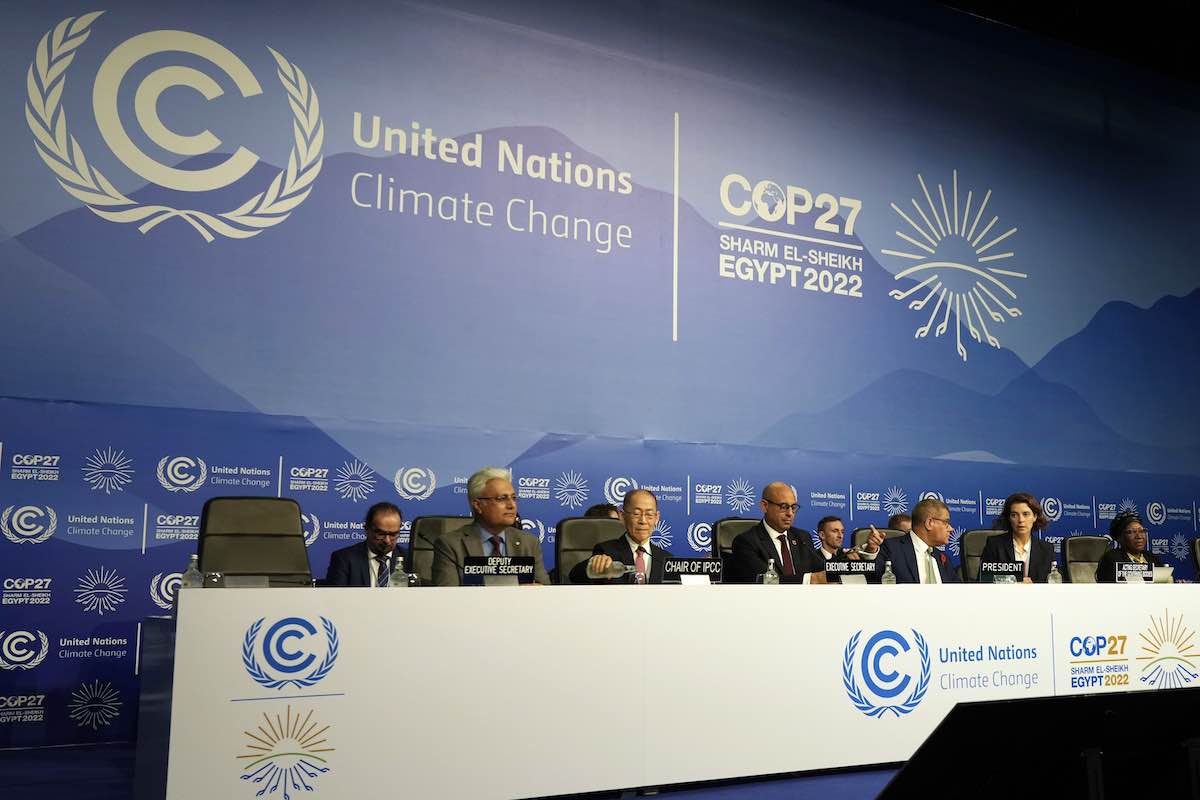A confrontation between wealthy and developing countries over responsibility and money is set to shape the UN climate change conference (COP27) in Egypt.
The European Union and other wealthy regions are facing mistrust from the developing world over their efforts to tackle the energy crisis and failing to keep financial promises.
EU member state officials have said that a strong European Union is necessary to make COP27 a success, but the bloc will have to work hard to regain its climate credibility if it wants to leave its mark on the talks, say observers.
“All eyes will be on us in Sharm El-Sheikh. The EU has always been at the forefront of climate action and we will continue to lead by example,” said then-environment minister of the Czech Republic Anna Hubáčková when EU member states agreed their negotiating position for COP27 in October.
However, the EU has not announced to raise its 2030 climate target ahead of the Egypt conference as agreed during last year’s COP26, instead saying it stands ready to do so once the “Fit for 55” climate and energy law reform negotiations are concluded, possibly by the end of this year.
“We will present this commitment in Egypt and it can serve as a challenge and inspiration for other countries to follow the EU’s example,” the Czech environment ministry told Clean Energy Wire in a written statement. “All countries should put forward ambitious targets and policies.”
While the EU has said it aims to speed up the transition to green energy to make the continent less dependent of fossil fuels – especially those from Russia – Europe has spent the better part of 2022 buying up oil and gas across the globe in an effort to replace Russian deliveries – pushing up prices and leaving poorer countries without supply. Thus, the continent stands accused of climate hypocrisy, hampering its ambition to lead.
“There is a need for the EU to show that the energy crisis has not knocked everything off course,” says Susi Dennison, a senior policy fellow at the European Council on Foreign Relations (ECFR), adding that “leadership by example” is no longer sufficient.
“We need to see the commitment, especially from bigger member states, that they are willing to take more of a hit domestically to move things forward. Without that they have no credibility in encouraging others to go further in implementation,” she told Clean Energy Wire.
Governments from more than 190 countries are expected in the Egyptian tourism centre Sharm El-Sheikh between November 6-18 to discuss how to combat climate change and its consequences.
The window is closing
The world is already experiencing the often devastating effects of global warming; with heavier and more frequent storms, forest fires, floods and droughts harming communities.
The just-released UN Emissions Gap Report showed that the window of opportunity to do something is closing. Even if all countries fulfilled their climate pledges, the world would still be on track for a temperature rise of 2.4-2.6°C by the end of this century.
A report by the Intergovernmental Panel on Climate Change (IPCC) had shown that greenhouse gas emissions would have to be reduced by almost half by 2030 to limit global warming to 1.5°C, a central goal of the Paris Climate Agreement from 2015 and seen as essential to avoid the worst effects of climate change and ensuring a more sustainable and equitable society.
Thus, COP27 in Egypt was planned as the “implementation COP”. With the Paris Agreement and its rules in place, the focus should have been on ways to implement measures that achieve ambitious climate goals. However, Russia’s war against Ukraine, the ensuing energy crisis and additional tensions on the global stage – such as the difficult U.S.-China relations – will overshadow talks in Sharm El-Sheikh.
“What was planned as a constructive ‘implementation COP’ will once again be a stress test for international cooperation amid geopolitical tensions and for how genuine the promises of Paris were,” writes journalist Bernhard Pötter in an editorial for Climate.Table.
Europe still has a chance to salvage its climate credibility at the COP, said Paddy Ryan and former Polish climate minister and COP24 president Michał Kurtyka in an article for the Atlantic Council. The EU has to reconcile its short-term efforts to secure energy supply with its long-term climate ambitions.
“Through more constructive gas diplomacy with the developing world and by accelerating domestic decarbonisation, Europe can begin to repair its damaged climate credibility in Sharm El-Sheikh.”
Gas diplomacy
It remains to be seen whether countries like Germany will be able to manage more constructive gas diplomacy. As many countries try to find alternatives to Russian fossil fuel supplies, the debate on exploration into new gas fields and what that means for climate targets gathered momentum ahead of the COP in Egypt.
While it is not an official agenda item in the climate negotiations, energy supply security and countries thinking about the exploration of new fossil fuel reservoirs is set to be a key topic surrounding the conference.
While reports – for example by the International Energy Agency (IEA) – say that new oil and gas fields are not compatible with the target of net zero emissions by 2050, Germany’s government is among those that want to allow public support for such projects in other countries. After some hesitation, the country was among a group of states signing on to a pledge to phase out public support for foreign fossil fuel projects by the end of this year at last year’s COP26.
However, amid the energy crisis, chancellor Olaf Scholz has been one of the most vocal proponents for exceptions. European and German environmental organisations have voiced sharp criticism in the run-up to the COP, but Germany has retained its stance.
Climate finance – and compensation
Developing countries’ anger at wealthier nations in part stems from their failure to deliver on key promises to mobilise $100 billion U.S. dollars from public and private sources each year by 2020 for climate action and adaptation in developing countries. Ahead of last year’s COP26, they said the target would be reached by 2023.
Developing countries are also calling for support to pay for losses and damages caused as a direct result of the climate crisis, as they are the least responsible but often among the most vulnerable.
“Climate impacts from heatwaves in India and Europe, floods in South Africa, Bangladesh and Pakistan and a drought in East Africa have resulted in losses and damages around the world over the course of the year, providing more cases for the argument that the current financial architecture is not able to address such losses and damages,” writes the Stockholm Environment Institute (SEI). The question of how to operationalise loss and damage finance is “a key nut to crack” at COP27, it states.
Both the $100 billion dollar pledge and “loss and damage” will be key issues at COP27, as finance is central in dealing with the climate crisis.
“What is needed is a big gesture around climate finance, not just by Europe; the U.S. is also part of this,” says ECFR’s Dennison.
Rising energy prices “gnaw” at unity
To provide effective, formal support and help emerging nations with their climate-friendly transition, last year’s COP26 birthed the world’s first “Just Energy Transition Partnership” (JETP). The U.S., UK, France, Germany and the European Union joined together and made a deal worth $8.5 billion dollars with South Africa to help the country move away from coal.
Under the German presidency, this year’s G7 decided to establish similar partnerships, but negotiations with India, Indonesia, Senegal and Vietnam have been difficult. Still, the German government hopes that one or two of these new partnerships can be presented during the climate conference.
EU states negotiate as a single group during UN climate talks, not as individual governments. As a result, European unity is key to the bloc’s negotiating power.
With its initial reaction to Russia’s war in Ukraine, the EU had shown strong unity, says ECFR’s Dennison. However, the bloc was now heading into a more difficult situation as rising energy prices were felt across the continent; “gnawing away at the unity”.
This was exemplified by the postponement of Franco-German government consultations in October, seen as a crack in relations caused by differing views on energy policy and how to tackle the current crisis.
The difficult situation so far does not mean that EU member states have given up their joint view that decarbonisation is the right way to go, says Dennison, but “it feeds into a difference of views in European capitals about how fast we can afford to go in this climate.”
This influences negotiations on key elements of the bloc’s sustainable growth strategy European Green Deal, but at the same time it could leave a mark on talks during the supposed “implementation COP”.
Key negotiators
The Czech Republic plays a key role in keeping the bloc together, as it currently holds the rotating presidency of the EU Council. As such, it also leads the COP negotiations. After environment minister Hubáčková stepped down from her post, there remains uncertainty over how this might influence Europe’s negotiation strength.
The ministry told Clean Energy Wire that deputy environment minister Jan Dusík will be chief negotiator of the Czech presidential delegation at COP, while the newly appointed minister Marian Jurečka “is also prepared to attend the ministerial segment” – most likely only for a day.
As Europe’s biggest economy and traditionally strong voice in international climate talks, Germany could also play a key role.
“We want to uphold the pressure to reduce emissions,” said a government official ahead of chancellor Scholz’s trip to Egypt on 7 and 8 November. Due to the energy crisis, some countries were asking for more time to implement the climate-friendly transformation, but it was Germany’s aim to continue “ambitiously and courageously”.
The country has been off course to reaching its 2030 climate targets, and government advisors today (4 November) said the government needs to drastically rethink its policy.
When the new government came into power shortly after last year’s COP26, it promised to massively speed up renewables expansion and present a plan on how to get back on track for climate targets before the end of 2022. It also made international climate policy a key issue, referring the responsibility from the environment ministry to the foreign office. The talks in Sharm El-Sheikh could show whether this changes Germany’s role, but partners so far remain sceptical, also because the coalition parties are not seen as a united front.
“Within the European picture there is quite some disappointment in what this German coalition has achieved in terms of climate leadership,” says researcher Susi Dennison. “The structure was there, the political will was there, the promises were there to make climate a centre in foreign policy, but the reality has been much more about compromise at every stage between the different parts of the coalition.”
[András Rostoványi, a reporter for Hungary’s Népszava who is currently a fellow in Germany with the International Journalism Programme, contributed to this story.]
This article was originally published on Clean Energy Wire. Republished here under a “Creative Commons Attribution 4.0 International Licence (CC BY 4.0)” . To read the original story, click here.










